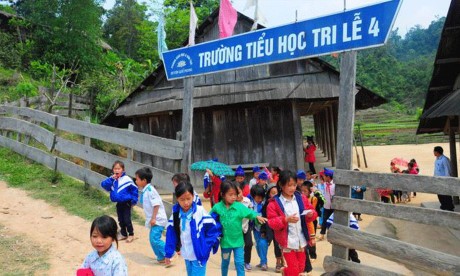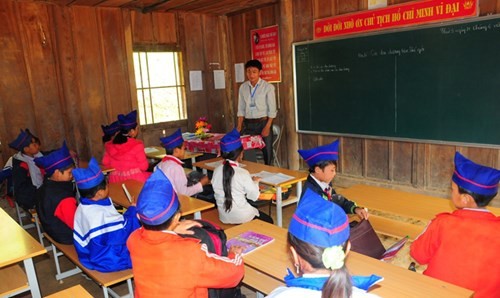(VOVworld) – Every day the 41 male teachers at Tri Le 4 primary school in Tri Le commune Nghe An province take turns teaching at six hamlet schools. From the commune’s center to the hamlet schools, they have to drive 40 kilometers, only 10 km of which are paved. The rest is along a muddy path which becomes slippery on rainy days. Despite the hardships, the teachers encourage each other to continue bringing education to their beloved pupils.
 |
| All teachers at Tri Le 4 primary school are male ones. (Photo: Quang Long) |
Huoi Moi 2 school in Huoi Moi hamlet under the management of Tri Le 4 primary school is in the worst condition in Tri Le commune. Huoi Moi 2 has 60 pupils from the first to the fifth grade. They are Mong from 10 different mountain villages, some located 10 km from the hamlet school, requiring the children to wake up at 4 a.m. and traverse mountain paths and wade streams to get to school. There are five male teachers at the Huoi Moi 2 school, each from a different province.
 |
| Mountain villages of Mong ethnic people in Tri Le commune. (Photo: Quang Long) |
Nguyen Ngoc Tan, of the Tri Le border guard station, said: “Due to miserably hard conditions, it’s difficult for a female teacher to work there for very long. Only male teachers can endure working at Tri Le 4 primary school and Huoi Moi 2 hamlet school.”
Huoi Moi 2 is isolated from the outside world. To make a phone call, the teachers must walk 3km up a steep hill. When it rains all weekend, the young teachers must stay at school, taking turns picking vegetables, gathering bamboo shoots and forest banana stalks, and catching fish.
The Thai ethnic teacher Luong Ngoc Xuyen who has worked at Huoi Moi 2 school for four years said: “Even male teachers have difficulty driving the road to school. Your strength quickly fades. Sometimes I feel I’m not strong enough to steer the motorbike. It’s only 5km from my house in the commune to the school. A lot depends on the weather. It takes me 2 to 3 hours to go to school if it’s rainy but only 30 minutes on sunny days. If it’s raining steadily, I often stay at school. In August and September I usually stay at school for the whole month.”
 |
| Do (Red) slope used to be a nightmare for the 41 male teachers at Tri Le 4 primary school. |
To drive the 10km to the school, on rainy days, rubber boots and raincoats are indispensable. Tho Ba Tru, a Mong teacher, told us that they’ve been able to go by motorbike to Huoi Moi 2 school for four years. Before that, they had to walk on a narrow footpath.
“Due to the extremely bumpy road, only male teachers who are fit enough can work at the school, although female teachers really want to teach there. It takes me more than hour to drive the 7km from my house to school. My motorbike has to be repaired once or twice a month. Many parts quickly wear out. Every two months I have to change the tires; brakes once a month; rims constantly replaced,” said teacher Tru.
 |
| A male teacher in Mung Long hamlet is teaching Mong pupils. (Photo: Quang Long) |
The youngest teacher and still single, Tru has gotten used to taking care of the pupils, from teaching them personal hygiene to teaching them how to read and write.
Tru shared his feeling: “I teach the children from the first grade because I know both Vietnamese and the local ethnic languages. Sometimes the children can’t understand Vietnamese. Teaching them to speak, sing, read, and write is quite difficult. They know nothing, wear ragged dirty clothes, and come to school with dirty arms and legs. We teach them how to dress neatly and wash their hands and feet. When they first came to school, they played as if they were at home. They had no concept of learning.”